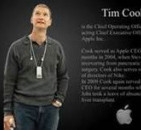The CEO of Apple Inc. Cook joined Apple in March 1998 as SVP of Worldwide Operations and also served as EVP of Worldwide Sales and Operations and was COO until he was named the CEO of Apple on August 24, 2011, succeeding Steve Jobs, who died on October 5, 2011, from pancreatic cancer. Cook had previously served as acting CEO of Apple after Jobs began a medical leave in January 2011.
In early 2012, he was awarded compensation of 1 million shares, vesting in 2016 and 2021, by Apple's Board of Directors. As of 2012, Cook's total compensation package of $378 million makes him the highest paid CEO in the world.
Cook grew up in Robertsdale, Alabama, near Mobile. His father was a shipyard worker, while his mother was a homemaker. Cook graduated from high school at Robertsdale High School, earned a B.S. degree in industrial engineering from Auburn University in 1982, and his M.B.A. from Duke University's Fuqua School of Business in 1988.
At Apple, his first assignment was Senior Vice President for Worldwide Operations. According to CNN, he had a "mandate to clean up the atrocious state of Apple's manufacturing, distribution, and supply apparatus". Cook is credited with pulling Apple out of manufacturing by closing factories and warehouses around the world. This helped the company reduce inventory levels and streamline its supply chain to match the efficiency of Dell Inc., dramatically increasing margins. These initiatives have proven key to Apple's success of being to unveil next-generation products, keeping them secret until they are ready for distribution to retail, forecasting demand and executing against that forecast. Cook has been quoted as saying "You kind of want to manage it like you're in the dairy business. If it gets past its freshness date, you have a problem".
In January 2007, Cook was promoted to COO.
Cook served as Apple CEO for two months in 2004, when Jobs was recovering from pancreatic cancer surgery. In 2009, Cook again served as Apple CEO for several months while Jobs took a leave of absence for a liver transplant.
In January 2011, Apple's Board of Directors approved a third medical leave of absence requested by Jobs. During that time, Cook was responsible for most of Apple’s day-to-day operations while Jobs made most major decisions. After Jobs resigned as CEO and became chairman of the board, Cook was named CEO of Apple Inc. on August 24, 2011.
Cook also serves on the board of directors of Nike.
In April 2012, Time Magazine included Cook on its annual 100 Most Influential People in the World list.
On October 29, 2012, Cook made major changes to the company's executive team. Scott Forstall resigned as senior vice president of iOS, becoming an advisor to Cook until his scheduled departure from the company in 2013. John Browett, who was SVP of retail, was dismissed after six months on the job (having received 100,000 shares worth $60 million when he joined). Forstall's duties were divided among four other Apple executives: design SVP Jonathan Ive assumed leadership of Apple's Human Interface team, Craig Federighi became the new head of iOS software engineering, while services chief Eddy Cue took over responsibilities for Maps and Siri, and Bob Mansfield (previously SVP of hardware engineering) returned to oversee a new technology group. This came after Q3 revenues and profits grew less than predicted, which was the second quarter in a row that Apple failed to meet expectations. One commentator said that Forstall was forced to step down as Cook "has decided to lance the boil as internal politics and dissent reached a key pitch". Cook's direction since becoming CEO was to build a culture of harmony, which meant "weeding out people with disagreeable personalities—people Jobs tolerated and even held close, like Forstall", although another journalist said that "Apple's ability to innovate came from tension and disagreement."
- Part of Speech: proper noun
- Industry/Domain: People
- Category: Entrepreneurs
Creator
- tonywang1119
- 100% positive feedback
